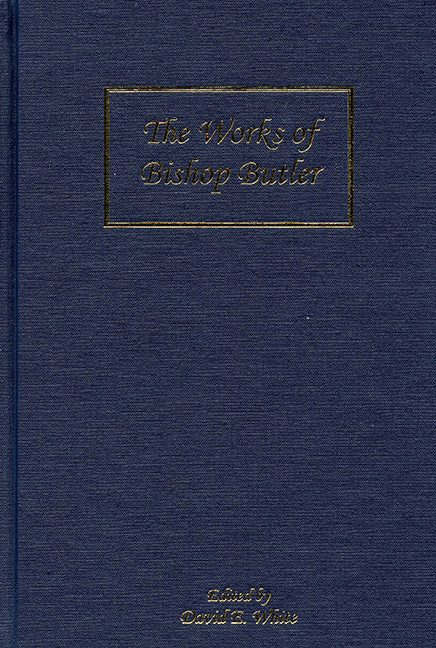Book contents
- Frontmatter
- Contents
- Acknowledgments
- Introduction
- A Note on the Text
- Part One Correspondence with Samuel Clarke
- Part Two Fifteen Sermons Preached at the Rolls Chapel
- Part Three The Analogy of Religion, Natural and Revealed, to the Constitution and Course of Nature
- Part Four Six Sermons Preached upon Public Occasions
- Part Five The Durham Charge
- Part Six Fragments
- Editorial Notes
- Bibliography
- Index
- Frontmatter
- Contents
- Acknowledgments
- Introduction
- A Note on the Text
- Part One Correspondence with Samuel Clarke
- Part Two Fifteen Sermons Preached at the Rolls Chapel
- Part Three The Analogy of Religion, Natural and Revealed, to the Constitution and Course of Nature
- Part Four Six Sermons Preached upon Public Occasions
- Part Five The Durham Charge
- Part Six Fragments
- Editorial Notes
- Bibliography
- Index
Summary
Bishop Butler was one of the greatest of the classical Anglican divines. Hooker was more important historically, Berkeley the greater philosopher, Paley more influential in education, but it is as true today as it was on June 16, 1752, the day Butler died and the day on which he is now commemorated in the Prayer Book, that to learn to think theologically one must apply oneself to the works of Bishop Butler. The value of Butler studies as an exercise is independent of one's religious persuasion, provided only the reader is willing to follow the instructions Butler gives in the preface to his Rolls sermons: the reader must be willing to be engrossed by the text, be determined to persevere in the face of difficulty even to the point of obscurity, and be capable of drawing conclusions independently, having been presented with only some observations on human nature and on the nature of the world in which we live.
The attitude commended here is illustrated by an anecdote told by Gandhi. During his early years in South Africa, Gandhi read about eighty books urged on him by missionaries. He remained unconverted, of course, but tells us in his autobiography of his experience with Butler:
Butler's Analogy struck me to be a very profound and difficult book, which should be read four or five times to be understood properly. It seemed to me to be written with a view to converting atheists to theism. The arguments advanced in it regarding the existence of God were unnecessary for me, as I had then passed the stage of unbelief, but the arguments in proof of Jesus being the only incarnation of God and the Mediator between God and man left me unmoved.
Others, equally intense in their studies, experienced a different outcome. James Barry is perhaps the most graphic illustration. Barry says of his huge painting, Elysium and Tartarus or the State of Final Retribution:
Just above the archangel with the balance which dips toward Tartarus stands a smaller angel discoursing on the analogy between religion and nature to the early Christian theologian Origen and to Pascal and Bishop Butler, who clutches his Analogy of Religion, a book which Edmund Burke had given to the artist shortly after his return from Italy in a successful effort to shore up a weakening belief in revealed religion.
- Type
- Chapter
- Information
- The Works of Bishop Butler , pp. 1 - 10Publisher: Boydell & BrewerPrint publication year: 2006



